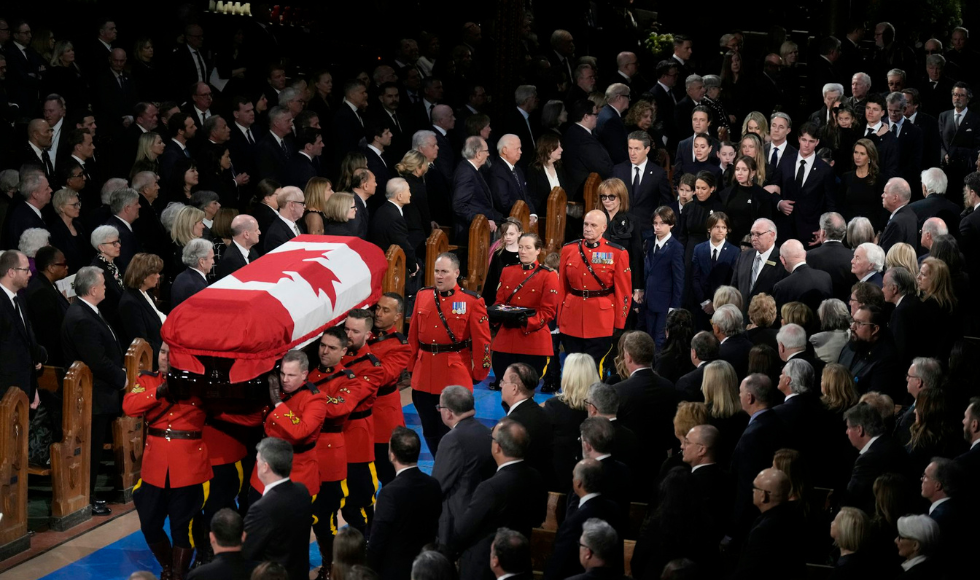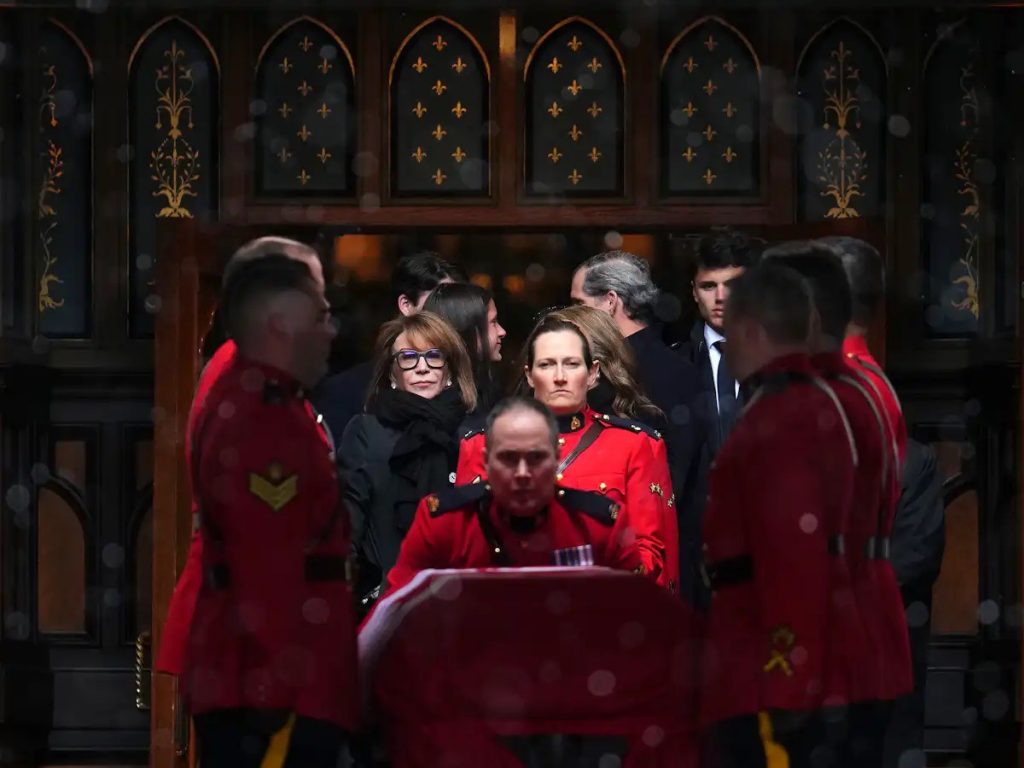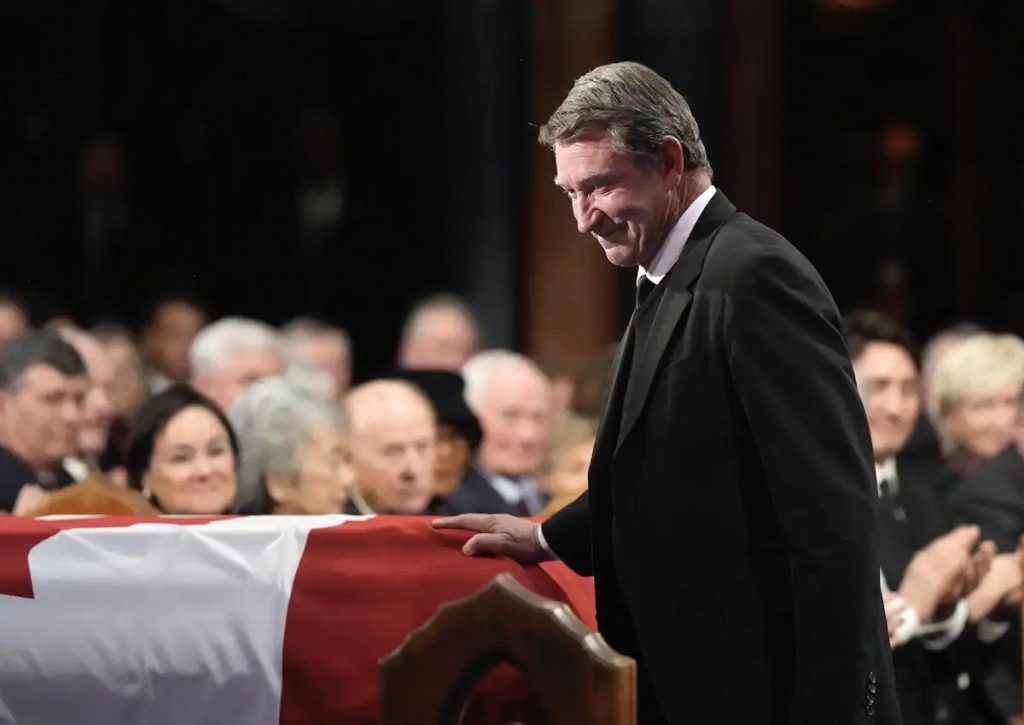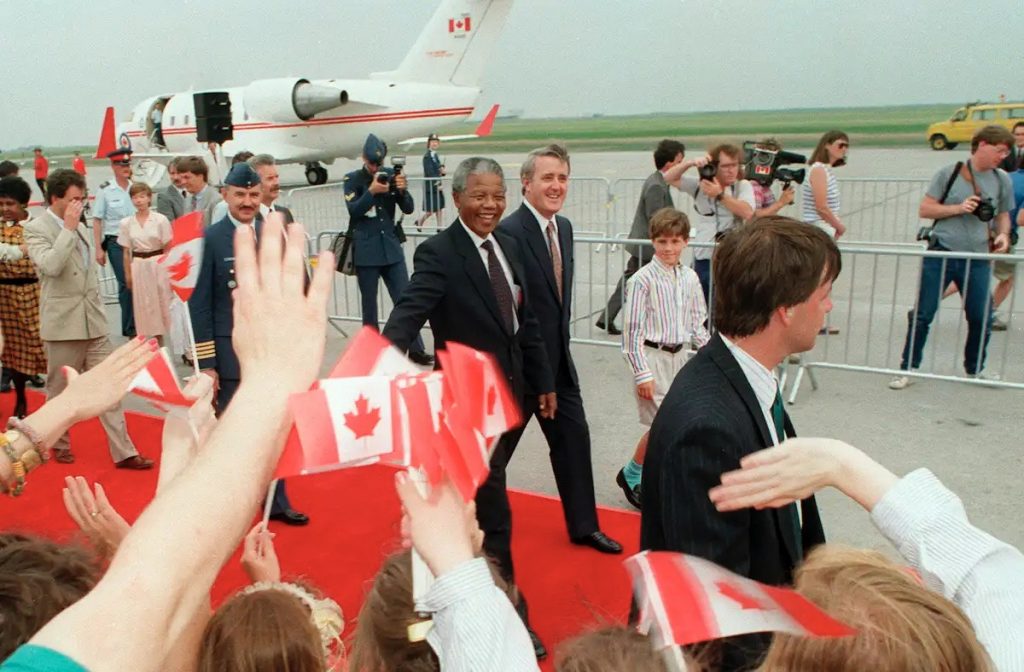Analysis: Brian Mulroney’s funeral: Loved ones, celebrities and dignitaries honour a global statesman

RCMP pallbearers carry the casket at the funeral of former prime minister Brian Mulroney at the Notre-Dame Basilica in Montreal. THE CANADIAN PRESS/Adrian Wyld
BY Donald Abelson
March 25, 2024
![]() This article is republished from The Conversation under a Creative Commons license. Read the original article.
This article is republished from The Conversation under a Creative Commons license. Read the original article.
It was snowing in Old Montréal when well over 1,000 people gathered in the neighbourhood’s historic and majestic Notre-Dame Basilica to pay their respects to Brian Mulroney, Canada’s 18th prime minister.
In the nine years that he held office — from 1984 to 1993 — Mulroney transformed Canada at home and abroad. As I took in this special and solemn occasion in Montréal, my mind was consumed with many things.
Mulroney was a prime minister with whom I worked closely for five years as the inaugural director of the Brian Mulroney Institute of Government at St. Francis Xavier University. He was a statesman who elevated Canada’s stature on the world stage, and a leader who never shied away from a political fight, particularly when the outcome could and would have had profound consequences for the country he loved.
Glowing tributes
His two-hour funeral was moving, tasteful, refined and dignified.
For those who knew Mulroney well — and how much of an effort Mila, his wife of 51 years, always invested in making every event special — this type of sendoff wasn’t unexpected.

Each of his sons recited a prayer, and Prime Minister Justin Trudeau, former Québec premier Jean Charest, Quebecor CEO Pierre Karl Péladeau and hockey legend Wayne Gretzky delivered heartfelt tributes. I know Mulroney would have been delighted to witness world leaders, celebrities, dignitaries, financiers and other close friends and colleagues come together to say goodbye.
Ontario cabinet minister Caroline Mulroney and her daughter, Theodora Lapham, were particularly poignant. The basilica was almost silent as Mulroney’s only daughter spoke, delivering a speech filled with love, respect and deep admiration.
Several minutes later, Theodora, struggling to hold back tears, performed a moving rendition of her grandfather’s favourite Edith Piaf song. Then she sang a stirring rendition of When Irish Eyes Are Smiling with Québec tenor Marc Hervieux, accompanied by a video clip of her grandfather singing the song. Those in attendance responded with a standing ovation.
Politics his passion
Had Mulroney been able to witness his own funeral, he would have been deeply saddened to watch Mila, their four children and 16 grandchildren grieve him.
But there’s little doubt he would have enjoyed keeping track of the politicians in attendance — including Bob Rae, Joe Clark, Jean Chrétien, Stephen Harper, Lucien Bouchard, Pierre Poilievre and Jagmeet Singh — and the kinds of discussions taking place among former and aspiring prime ministers that could signal a new direction for Canada.
Mulroney was blessed with an extraordinary life, one that began in the small town of Baie-Comeau, Que., in 1939 and ended in Palm Beach, Fla., a few weeks before his 85th birthday.
When I had an opportunity to sit down with Mulroney at his home in Palm Beach just weeks before the COVID-19 pandemic took hold in early 2020, we talked about his life, what he imagined he would do with it when he graduated from St. Francis Xavier University in 1959 and how his professional and family commitments kept him grounded for so many years.
As we took in the beautiful surroundings from his terrace, I asked him if he ever thought he’d be living this kind of life. He laughed, then said: “I thought after law school I would go back to Baie-Comeau and become a small-town lawyer.”

His political opponents might have wished he’d done just that. By his own admission, Mulroney was a polarizing figure. But he knew how to lead, how to build an extensive network of contacts around the world and when it was appropriate to draw on his ire, charm, wit or charisma to get the people he needed on board.
Few leaders could read the political tea leaves as well as he could. He had astute instincts and employed them when necessary.
As is the case with most leaders, Mulroney had regrets when he left office, including his government’s failure to secure passage of the Meech Lake and Charlottetown constitutional agreements. He also admitted to mistakes he made as leader, and to errors in judgment in relation to the Airbus scandal.
Significant accomplishments
In eulogizing his brother, Robert F. Kennedy, the late Sen. Ted Kennedy — who later become a close friend of Mulroney’s — observed:
“My brother need not be idealized, or enlarged in death beyond what he was in life, to be remembered simply as a good and decent man, who saw wrong and tried to right it, saw suffering and tried to heal it, saw war and tried to stop it.”
Mulroney doesn’t need to be idealized either. But he does deserve to be recognized for his achievements. In the fullness of time it will probably become evident that few prime ministers in Canadian history accomplished as much as he did.
He negotiated the passage of the Canada-Free Trade Agreement and the North American Free Trade Agreement, convinced U.S. President George H.W. Bush to sign the acid rain agreement, fought for the protection of French-language minority rights in Manitoba, played a critical role in helping free Nelson Mandela and galvanizing international pressure to end apartheid in South Africa, brought much-needed famine relief to millions of people starving in Ethiopia and introduced the goods and services tax (GST) that has generated billions of dollars in revenue for the federal government.

In her eulogy to her father, Caroline Mulroney said that in the last conversation her mother, Mila, had with Mulroney, she asked: “Brian, are you coming back to me?”
“I plan to,” he replied.
Those were his final words. He often said that one day, he would be going to that big political rally in the sky. I can only imagine what debates he’s having today.![]()
Donald Abelson, Professor, Political Science; Academic Director, Wilson College of Leadership and Civic Engagement, McMaster University. This article is republished from The Conversation under a Creative Commons license. Read the original article.


